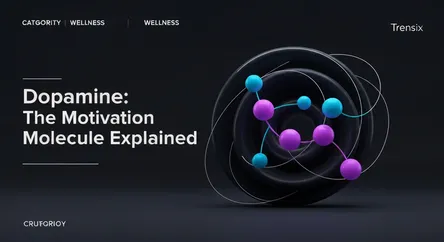Wellness
Dopamine: The Motivation Molecule Explained

Understand dopamine, the "feel-good" chemical messenger in your brain, its role in motivation, and how modern life impacts its balance.
What is it?
Dopamine is a crucial chemical messenger, acting as both a hormone and a neurotransmitter in the brain. Often called the “feel-good” hormone, it plays a central role in the brain's reward system. When you engage in a pleasurable activity, like eating good food or achieving a goal, your brain releases dopamine, which creates feelings of satisfaction and motivates you to repeat the behavior. Beyond just pleasure, dopamine is vital for numerous functions, including motor control, focus, memory, and mood regulation. It's a key driver of human behavior, influencing what we find interesting and pushing us to seek out rewarding experiences.
Why is it trending?
Dopamine has entered mainstream wellness conversations, largely due to our increasingly digital lives. Concepts like "dopamine fasting" or "dopamine detox" have become popular, suggesting that abstaining from constant stimuli like social media can reset our brain's reward pathways. The endless scroll on platforms provides constant, small dopamine hits, leading to discussions about digital addiction and its impact on attention spans. This has sparked interest in how we can better manage our relationship with technology and other stimuli to maintain a healthier dopamine balance and improve mental focus.
How does it affect people?
A balanced level of dopamine is essential for feeling motivated, focused, and happy. However, imbalances can significantly impact well-being. Low dopamine levels are linked to a lack of motivation and are associated with conditions like Parkinson's disease and depression. Conversely, excessively high dopamine activity can contribute to impulsive behavior and is linked to addiction, as substances can cause a large, rapid increase in dopamine. In daily life, understanding dopamine helps people recognize how activities, from exercise to checking phone notifications, shape their motivation and habits, impacting their overall mental health.